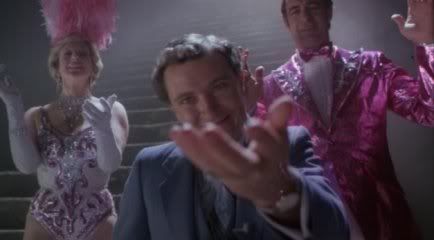
"Mum! Dad! Don't touch it! It's evil!" - KEVIN, the soon-to-be-orphaned 11-year-old boy, at the end of Time Bandits
Long before I knew who -- or what -- Monty Python was, I was already a fan of the work of half of that venerable comedy troupe's members thanks to a certain subversive children's film called Time Bandits, which was a big hit at the box office when it was released in 1981. Unfortunately, I didn't get to see it when it was in theaters, but thanks to frequent airings on PRISM (a Philadelphia-area premium cable channel that broadcast all the Flyers and Phillies home games, which is why my father insisted on it over higher-profile movie channels like HBO or Cinemax), it was a staple in the Clark household for many, many years. It was only much later when I started reading up on Monty Python in Kim "Howard" Johnson's First 200 Years of book that I discovered that Terry Gilliam, the American-born cartoonist who gave the Flying Circus its distinctive animated links, was also the man responsible for one of my favorite films of all time. Furthermore, it starred two other members of the troupe (John Cleese and Michael Palin) and one of them (Palin) had also co-written the film with Gilliam. If that doesn't make it a de facto Python film, then I don't know what will.
Anyway, whether they did so knowingly or not, Gilliam and Palin (and to a lesser extent Cleese) laid the groundwork for my future Python fandom (some might call it an obsession) and found the nexus between history and comedy that has informed my sense of humor to this day. That's a lot of baggage for a rollicking adventure story about a band of dwarfs in the employ of the Supreme Being who jump through holes in the fabric of time to steal from the rich and give to themselves, but Time Bandits can shoulder it. If it couldn't, it wouldn't be so well-beloved nearly three decades later -- and this isn't rose-tinted nostalgia talking. The film really does hold up and it stands as a testament to the power of imagination and individualism, two of Gilliam's pet themes which run through all of his films and which are embodied by its boy hero Kevin, played by 11-year-old Craig Warnock, who wins my vote for Best Child Actor Ever.
Another theme that comes into play right from the get-go is the rampant materialism that Gilliam saw sweeping Britain, with Kevin's complacent parents watching a hideous game show called Your Money Or Your Life (hosted by a sleazy Jim Broadbent) and ignoring their son, whose enthusiasm for ancient Greek history could not have been hereditary. Rather, they're more concerned with the latest household gadgets and keeping up with the neighbors. "Well, at least we've got a two-speed hedge-cutter," moans Kevin's mum, making one wonder why such a thing would even be necessary. They're even the sort of family that has plastic on the furniture, which is a detail that pays off handsomely later on when it is revealed that David Warner's Evil Genius has everything in his domain (including his throne and his minions) covered in plastic as well.
As for Kevin, his adventure begins late one night when an armored knight on horseback comes crashing out of his wardrobe, which only disturbs his parents inasmuch as it makes a terrible racket. The next night Kevin is prepared, going to bed early with a satchel, a torch (that's a flashlight to us Yanks), and a Polaroid camera at the ready -- and they all come in handy when a band of six little people with a strange map emerge from the wardrobe after his parents have gone to bed. (His parents must be very heavy sleepers, too, since they don't come barging in after one of the well-armed bandits fires his machine gun into the ceiling.) Once they determine that Kevin isn't a threat, the bandits (who don't bother introducing themselves -- introductions are for polite people) enlist his help in finding the way out of his room and drag him along when the Supreme Being shows up (in a most intimidating guise) to recover his map. The bandits evade him, though, and, falling through a convenient time hole, land in Italy during the Napoleonic Wars.
It's at this point that the action pauses long enough for us to meet the title characters, a motley crew led by David Rappaport (as the autocratic Randall) which includes Jack Purvis (as Wally, wielder of the machine gun and soon to be a Gilliam regular), Kenny Baker (a.k.a. the man inside R2-D2 as Fidgit), Malcolm Dixon (as Strutter, the most level-headed of the bunch), Mike Edmonds (as the submoronic Og) and Tiny Ross (as the ravenous Vermin). They also reveal their objective, which is to rob the rich and famous throughout history, starting with Napoleon (played by first guest star Ian Holm, who later reappeared in Brazil as Sam Lowry's spineless boss). Since this is a film aimed at kids, Gilliam and Palin take the most basic piece of information about Napoleon -- that he was very short -- and make him out to be totally obsessed with the heights of world leaders. Of course somebody like that would be instantly attracted to the diminutive bandits ("That's what I like! Little things hitting each other!") and, one rousing rendition of "Me and My Shadow" later, they have his complete confidence. All they have to do is wait for him to drink himself into a stupor and then rob him blind, which is the point where Gilliam and Palin take the other piece of Napoleon trivia -- that he always kept his right hand tucked into his shirt -- and put a comical spin on it. That's the Monty Python way: introduce a legendary figure and completely take the piss out of them.
Case in point: the film's next stop is "exactly in the Middle Ages" -- more specifically, Jolly Old England during the time of Robin Hood. Before the group meets the freedom fighter in the green tights, though, they have a run-in with a pair of star-crossed lovers (Shelley Duvall and Michael Palin) whose romantic tryst they ruin -- and who will appear again later on -- and fill Kevin in on the backstory, which is a funny thing to do a half hour into a film, but at least it doesn't sound too much like exposition coming from Rappaport. Then, after spying a band of ruthless robbers at work, they arrange a meeting with the head Hood himself (an ingratiatingly oblivious Cleese), whose clean-scrubbed countenance is in sharp contrast to his unpleasantly grotty Merry Men. (Note the unmistakable buzzing of flies on the soundtrack.) As they did with Napoleon, Gilliam and Palin take the most basic thing everybody knows about Robin Hood -- that he stole from the rich and gave to the poor -- and turn it against the time bandits by having him requisition their sizable haul (which includes, among other things, the Mona Lisa) and give it away to the poor (who also receive a punch in the head just to even things out). Naturally this doesn't sit well with the diminutive thieves and they drag Kevin away before he can volunteer himself for a life of poor hygiene and dodging the guy who likes to arm-wrestle everybody.
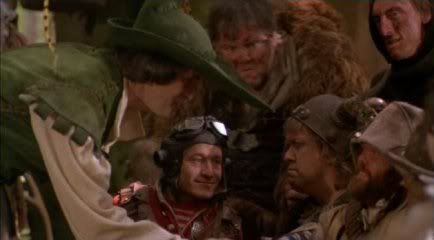
While the bedraggled bandits try to figure out their next move, we're introduced to Evil, who is aligned with Kevin's parents thanks to his obsession with technology ("I would have started with lasers, eight o'clock, day one."), but whereas they sublimate their aggressive tendencies by watching game shows, Evil has a habit of blowing up his own underlings whenever they question him -- even if he admits it's a good question. And like Kevin's parents, Evil covets what other people have, like the Supreme Being's power ("When I have understanding of computers," he says. "I shall be the Supreme Being!") and the time bandits' purloined map. To acquire the latter, Evil takes control of Og's mind (not a difficult task) and plants the idea that they should go after the Most Fabulous Object in the World. First, though, Kevin is separated from the others and winds up in Ancient Greece, which leads somewhat unexpectedly to the most emotionally resonant section of the film.
This is largely because, faced with a legend (King Agamemnon of Mycenae) who's not so easy to pin down or make easy jokes about, Gilliam and Palin take a somewhat less heightened approach to the material and give Kevin the chance to actually experience what it would be like to live in ancient times (as opposed to just being a tourist). He fits in so well, in fact, that it's almost a pity that the meddling midgets have to catch up with him and abduct him, but before that happens Kevin spends some quality time with Agamemnon (an authoritative Sean Connery), the kind of father figure he wishes he had in real life. Agamemnon even teaches him a magic trick ("Kings aren't supposed to do things like that!") and offers to adopt him -- much to the visible dismay of the queen. On second thought, maybe it's a good thing Randall and company come along when they do. When Agamemnon makes his announcement the queen shoots him a look that could kill and it's easy to imagine Kevin being the one whose goose gets cooked.
Just as the time bandits robbed Napoleon only to lose their ill-gotten gains to Robin Hood, history repeats itself when they empty Agamemnon's coffers ("He didn't have anything to spend it on, did he?" Randall rationalizes. "Stuck out in Greece -- lowest standard of living in Europe.") only to wind up on the Titanic just prior to its sinking. (They also have their second run-in with Palin and Duvall's ill-fated couple, only this time instead of having a "problem," Palin has a thing on the end of his nose. Those two just can't catch a break, can they?) It's at this point that Evil pulls them into the Time of Legends -- where their formal wear is cleverly reversed -- and the gang has a terrifying run-in with a middle-aged ogre (Peter Vaughan, later to play a pivotal role in Brazil), his doting wife (Katherine Helmond, ditto), and a giant before making the arduous trek to the Fortress of Ultimate Darkness, where Randall is convinced they'll find the Most Fabulous Object in the World. But first they have to break through an invisible barrier ("Oh, so that's what an invisible barrier looks like," quips Og), after which the Fortress is revealed in all its malevolent glory. (No "It's only a model" cracks here, even if it is ultimately revealed to be built out of Lego bricks.)
Once they enter the Fortress -- over Kevin's protests -- the link between the power-hungry Evil and Kevin's materialistic parents is made about as explicitly as it can be. First of all, the Most Fabulous Object in the World turns out to be the Moderna Wonder Major All-Automatic Convenience Center-ette, which was the big prize on Your Money Or Your Life, and Jim Broadbent's unctuous host is employed to entice the bandits into handing over the map in exchange for it. (Kevin's parents are also there, beckoning him forward, but he doesn't take the bait.) Of course, the game show host is really Evil in disguise and once he has the map he imprisons the gang in a cage which is suspended over an abyss. This leads to the most suspenseful sequence in the film where they use their ingenuity to effect a death-defying escape, accompanied by an inspired improvisation by percussionist Ray Cooper. (I haven't mentioned it yet, but all of the music in the film is wonderful, from Mike Moran's rousing score to Trevor Jones's synth-heavy Greek dance piece to George Harrison's "Dream Away," which plays over the closing credits. If the powers ever saw fit to release a soundtrack for Time Bandits, I would snap it up in a heartbeat.) Then, with the help of warriors from the past (American cowboys and knights on horseback, Greek archers) and some more modern weaponry (a tank and a moon lander with a laser), they engage in a battle royale to the death with Evil, who takes on all comers single-handed.
And just how do we know that Evil really is evil? Well, for starters, he blows up a dog. (That's pretty evil by anyone's standards, especially coming from somebody who claims to be "a reasonable man") He can also control machinery, which is downright infernal, but what really puts him over the top is when he causes the death of Fidgit, easily the friendliest of the time bandits. It was all fun and games before, but all of a sudden it's serious (Wally's emotional outburst is proof of that), and Evil is on the verge of triumphing when the Supreme Being swoops in to put a stop to it. As embodied by Ralph Richardson, the Supreme being is a fussy headmaster who's more concerned with tidiness ("What a dreadful mess" is how he sums things up) than he is with finding reasonable explanations for his actions (or inaction, as it were). One of my favorite moments in the film comes when Kevin asks him a nagging question about the necessity of evil and he nips behind a column -- where, I imagine, he can take as much time as he needs to formulate an appropriate response -- and the only thing he comes back with is "I think it's something to do with free will." Because he is "the nice one," he resurrects Fidgit and puts everyone back to work for him. (Their first job: pick up all the pieces of concentrated evil that are scattered about the place. "One drop of that," the Supreme Being warns, "could turn you all into hermit crabs.") There's no place in Creation for Kevin, though, so he's left behind once again.
Which brings us to the controversial ending. Since Kevin wakes up back in his own bedroom (which is filled with smoke because his house on fire), that means it must have all been a dream, right? After all, the climactic battle with Evil is represented by the arrangement of the toys on his floor (which echoes the cut-out of the knight on the photo of the forest on his wall at the start of the film), so it's an open-and-shut case, right? Well, it doesn't take long for Gilliam and Palin to blow the lid off that theory, starting with the revelation that the firefighter who rescues Kevin is none other than Sean Connery. Then there's the satchel full of all the Polaroids he took during his adventures, which should be enough to convince the most hardened skeptic. But then comes the pièce de résistance: the thing that started the fire was the leftover piece of Evil that was missed when the bandits were cleaning up. Furthermore, when Kevin's parents touch it -- after being specifically told not to -- they explode, leaving two smoking piles of ashes. It's a dark ending, to be sure, and one that would have horrified my mother if she had taken me to see this in theaters. (Gilliam claims that it's not upsetting because Kevin has proved beyond a shadow of a doubt that he's capable of getting by without his disinterested parents, but I can understand it if some people don't buy that.) Personally, I was always disappointed that the film didn't include a shot of Kevin's parents as hermit crabs. That would have been awesome.
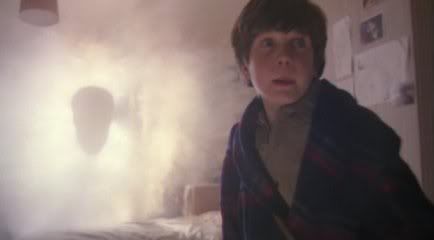
Back in April of this year, I happened to take in Tim Burton's 3D "reimagining" of Alice in Wonderland, and something odd struck me. In the movies, characters are constantly being whisked away from the dull drudgery of their everyday lives and then magically (or at least improbably) deposited into colorful worlds of adventure and thrills. And how do these characters generally react? Are they grateful to have escaped the shackles of drab, workaday reality? Generally, the answer is no. Like Alice in Burton's movie, they spend the majority of the running time trying to get back home and whinging about every obstacle which stands in the way of that goal. "Please," these characters fairly demand, "restore me this instant to my previous state of stagnation and despair. I want tedious, predictable familiarity as soon as possible."
But not Kevin. Not the 11-year-old hero of Time Bandits. Once he's shanghaied by a gang of thieving, time-traveling dwarfs, he doesn't wuss out and start bawling for his mum. We've already met Kevin's mum by this point, and we know she's perfectly awful. His dad, likewise. Just dreadful people. They're not physically or verbally abusive, mind you. Director and co-writer Terry Gilliam mercifully spares us this too-common kids movie trope. We don't have to watch Kevin's dad thrash his son with a belt and say something like, "And you'll get more of the same if I ever hear you spouting any more of that dreamy nonsense!" No, they're just unimaginative, sedentary, and generally useless. In that sense, they're a lot like Uncle Henry and Aunt Em in The Wizard of Oz, in many ways the obvious cinematic progenitor of Time Bandits. But there's a difference. Henry and Em have some semi-redeeming characteristics. Em bakes crullers for her employees and tells off mean old Miss Gulch; cutely befuddled Henry deflates Miss Gulch's pomposity with his homespun humor. All Kevin's parents do is nag their son, stare blankly at the television, and natter on about consumer appliances.
The opening scenes of The Wizard of Oz have to establish a Kansas that's bad enough for Dorothy to want to leave but just (barely) good enough for her to want to come back. With the corresponding scenes from Time Bandits, Gilliam only has to accomplish the first half of that equation. Neither Kevin nor we in the audience would be sad if he left this place behind. But by the same token, Kevin isn't suffering too terribly here either. His room certainly has a good selection of toys, thanks to his parents' materialism. So when Kevin goes on his bizarre adventure with the time bandits, he's not weighed down with terrible emotional baggage. In contrast, please see Robert Zemeckis's The Polar Express, in which several of the young travelers have sad backstories and other emotional problems which initially keep them from fully enjoying the journey.
The sum total of all this is that Kevin is allowed to fully enjoy the amazing opportunity he's been given. He pays occasional half-hearted lip service to returning home, but even this dissipates by the movie's midpoint or so. Another good touch was the decision not to make Kevin a skeptic who refuses to accept the situation he's in. Again, contrast this film with The Polar Express, in which the young hero requires a truly extraordinary amount of convincing before he's ready to believe in Santa Claus. (Seriously, watch that movie sometime. That kid is a hardcore nonbeliever!) So if Kevin's not pining for home (or the fjords) and he's not asking pesky, practical questions about his situation, what is he doing? Well, for one, he's getting to fulfill every nerd's secret dream: putting his arcane knowledge to use. See, unlike his jaded, video-sated parents, Kevin is a bit of a history buff and is engrossed with grisly factoids about ancient warriors and famous battles. So when he joins the bandits in jumping from era to era, committing daring capers, the boy at least has a broad outline of human history -- the names, the places -- and therefore manages to collect his bearings fairly quickly in any given setting. That's a major asset both to the film and to the characters.
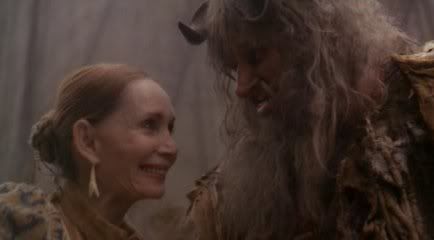
I did not grow up with this film, sadly. I would've been six when it came out, and when you're that age your parents pretty much decide what movies you see and don't see. The films I did see then were either ones with the reliable Disney or Spielberg brand names or installments of various franchises (Superman, Star Wars, Muppets etc.) I don't regret that. They were, nearly without exception, quite good films and instilled within me a love of movies that has stayed with me to this day. The downside, of course, is that I didn't see Time Bandits until I was an adult and the film came out on DVD, so I'll never know what effect the film might have had on a six-year-old me. But I don't want to return to childhood, even if it were possible to do so. Adults often think they do, but they forget the #1 activity of childhood: fantasizing about being grown up. That's what play is mainly about. Kids learn early on that it's the big people who have all the power and make all the decisions, so they covet adulthood and cherish each and every token of their own impending maturity. There is no greater insult to an eight-year-old than being accidentally referred to as a seven-year-old, and "babyish" is an adjective with a deadly connotation. Once your favorite toy or game has been called "babyish," it is very likely no longer your favorite. It's such a mixed-up world: people spend their childhoods wanting to be adults and their adulthoods wanting to be kids again.
One of the great, liberating things about Time Bandits is that, like The Wizard of Oz, it takes its young protagonist seriously. Salman Rushdie adroitly described Dorothy Gale as both the subject and object of her film and pointed out that, once she is deposited in Munchkinland, she is never treated as a child (as she was in Kansas) but as a heroine. Kevin, too, acts as both the subject and object of Time Bandits -- subject in that he is the main character with whom the story begins and ends (we are never long out of his presence), object in that he spends a lot of his time reacting to the rapidly changing circumstances of the plot. We in the audience generally gauge the situation by studying Kevin's reaction. (His instincts are spot on.) And like Dorothy, Kevin is immediately thrust into a position of mature responsibility, with dysfunctional adults actually relying on him and his expertise. People older than Kevin are actually looking to him for guidance and help! It's funny how Time Bandits, The Wizard of Oz, and Disney's Snow White and the Seven Dwarfs all partially accomplish this by introducing characters who are physically smaller than the hero. One of our most common synonyms for adult is "grown up," which twice emphasizes an individual's height. So it's no wonder that fantasy films are full of elves, dwarfs, Smurfs, Munchkins, Hobbits, Oompa Loompas, and other height-challenged beings. To a kid, that's a delightful paradox: the grown up isn't literally grown up. But, like Dorothy (and not like Snow White), Kevin hold his own against those larger than he is -- sometimes much larger! In the Time of Legends sequence, for instance, it's the boy who comes up with strategies for dealing with an ogre and a lumbering giant. And even the bona fide historical legends he meets turn out to be inadequate, immature, or incomplete in some way. Napoleon, unsurprisingly, has a pretty nasty Napoleon Complex and prefers puppet shows to battle. Poor, lonely Agamemnon's marriage has gone sour, and he longs for a son. Robin Hood is so cheerfully idiotic and vacantly genteel that you wonder how much longer he'll manage in his decidedly uncouth, coarse surroundings. Even God's workmanship turns out to be shoddy, and the man Himself is revealed as a blustery bureaucrat.
Time Bandits is a helluva thing. Three ensuing decades have only made the film look even better than it must have in '81. The production design is rich without being overbearing or garish. The humor is earthy and often dark without being snide or childish. It doesn't rely on cheap shots or pop culture references. It gets its jokes in, tells a cracking adventure story, and even has plenty of fodder for thought. Watching this film and The Meaning of Life back to back has been revelatory. Were films really this heedlessly ambitious and unreasonably entertaining just a few decades past? What a chasm exists between these bold Pythonic excursions and, let's say, Furry Vengeance or Paul Blart: Mall Cop. I don't mean to use those last two movies as easy examples simply because they're "mainstream" or popular with the "wrong" people. I don't know what "mainstream" even is anymore, and there are no "wrong" people. I'm just using those as examples of the safe, boring, numbing, formulaic, and cowardly films being churned out as children's films and comedies today. Time Bandits certainly was not made for the arthouses, and it turned a healthy profit on its initial investment. The art films and independent films will take care of themselves, as they always have. We need to demand more of our mainstream, strictly-for-entertainment, "fun" pictures -- kids flicks, comedies, action films, adventure stories! That's where we're lacking. Let's not put plastic slipcovers over our minds every time we duck into the cineplex, for Christ's sake.
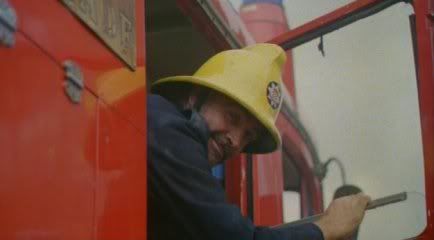
Up Next: Well, we're coming up on the Halloween season, and since nothing is more frightening than modern man's alienation, we're going to thoroughly deconstruct Fassbinder's... Nah, I'm just messin' with ya. It's that singing killer plant movie. You know, the one with whatshisface. The squirmy little guy with the glasses from Ghostbusters. Oh, and that other guy. He's in it, too.

Leave a comment